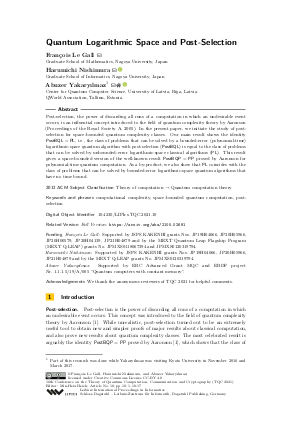LIPIcs.TQC.2021.10.pdf
- Filesize: 0.71 MB
- 17 pages

 Creative Commons Attribution 4.0 International license
Creative Commons Attribution 4.0 International license

Post-selection, the power of discarding all runs of a computation in which an undesirable event occurs, is an influential concept introduced to the field of quantum complexity theory by Aaronson (Proceedings of the Royal Society A, 2005). In the present paper, we initiate the study of post-selection for space-bounded quantum complexity classes. Our main result shows the identity PostBQL = PL, i.e., the class of problems that can be solved by a bounded-error (polynomial-time) logarithmic-space quantum algorithm with post-selection (PostBQL) is equal to the class of problems that can be solved by unbounded-error logarithmic-space classical algorithms (PL). This result gives a space-bounded version of the well-known result PostBQP = PP proved by Aaronson for polynomial-time quantum computation. As a by-product, we also show that PL coincides with the class of problems that can be solved by bounded-error logarithmic-space quantum algorithms that have no time bound.





















Feedback for Dagstuhl Publishing